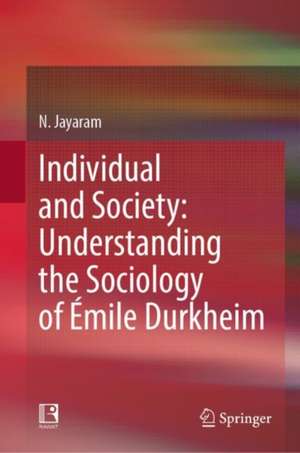Individual and Society: Understanding the Sociology of Émile Durkheim
Autor N. Jayaramen Limba Engleză Hardback – 11 ian 2025
The book explores Durkheim's groundbreaking analyses of the interplay between society, religion, politics, and education. It highlights his pioneering contributions to the subdisciplines of the sociology of religion, political sociology, and the sociology of education. It underscores the contemporary relevance of Durkheim's sociological legacy. This book is highly relevant for postgraduate students and researchers in sociology, social anthropology, and social sciences in understanding Emile Durkheim's work in sociology.
Preț: 697.00 lei
Preț vechi: 820.00 lei
-15% Nou
Puncte Express: 1046
Preț estimativ în valută:
133.37€ • 145.33$ • 112.38£
133.37€ • 145.33$ • 112.38£
Carte disponibilă
Livrare economică 02-16 aprilie
Preluare comenzi: 021 569.72.76
Specificații
ISBN-13: 9789819769438
ISBN-10: 9819769434
Pagini: 300
Ilustrații: Approx. 300 p.
Dimensiuni: 155 x 235 mm
Greutate: 0.42 kg
Ediția:2025
Editura: Springer Nature Singapore
Colecția Springer
Locul publicării:Singapore, Singapore
ISBN-10: 9819769434
Pagini: 300
Ilustrații: Approx. 300 p.
Dimensiuni: 155 x 235 mm
Greutate: 0.42 kg
Ediția:2025
Editura: Springer Nature Singapore
Colecția Springer
Locul publicării:Singapore, Singapore
Cuprins
List of Tables and Diagrams.- Preface.- Introduction.- The Impetus.- The Misconceptions.- The Perspective.- The Resources.- Organisation and Conventions.- Émile Durkheim: The Man, His Milieu and Work.- The Academic Career.- Political Activism: The Dreyfus Affair.- Intellectual Antecedents and Milieu.- The Durkheimian School.- Conception of Sociology: An Autonomous Positive Social Science.- Continuum of Social Facts.- Independence of Sociology from Philosophy.- The Emphasis on Methodology.- The Reliance on Objective Data.- The Logic of Functionalism.- The Comparative Nature of Social Science.- Sociologism or Anti-Reductionism.- The Conservative Streak.- Applied Sociology vs. Application of Sociological Knowledge.- Sociology: Its Subject Matter and Method of Study.- Characteristics of a Social Fact.- Methodology for the Study of Social Facts.- The Moral Basis of Social Order: The Sociology of Law and Morality.- The Function of the Division of Labour.- The Causes and Conditions of the Division of Labour.- Abnormal Forms of the Division of Labour.- Suicide: The Aetiology of Social Health.- Sociological Definition of Suicide.- Extra-Social Explanations of Suicide.- Social Causes and the Typology of Suicides.- Suicide and Social Policy.- Religion and Society: Sociology of Religion.- The Choice of Aboriginal Religion.- Definition of Religion and of Religious Phenomena.- The Essential Social Nature of Religion.- Politics and Society: Political Sociology.- Professional Ethics and Civic Morals.- Socialism.- Secular Morality, Education, and Society: Sociology of Education.- Education and Sociology.- Moral Education.- The Evolution of Educational Thought.- Conclusion.- Social–Individual: The Dichotomy.- Individual and Society: The Dialectics.- Recapitulating the Observations on Individual–Society Relations.- Coda: Why Read Durkheim Now.- Durkheimian Vocabulary: An Annotated Glossary.- References.
Notă biografică
N. Jayaram retired as Professor of Sociology from Tata Institute of Social Sciences, Mumbai. He was Visiting Professor of Indian Studies at The University of the West Indies, Trinidad. The areas of his interest include the Study of Indian Diaspora and Theory and Methods in Sociology. He was the Managing Editor of Sociological Bulletin (2000–2015), the journal of the Indian Sociological Society, and a recipient of ET Now Education Leadership Award (2013) and Lifetime Achievement Award (2020–21) of the Indian Sociological Society.
Textul de pe ultima copertă
This comprehensive volume explores the foundational contributions of the eminent French sociologist Emile Durkheim. It delves into his writings in political sociology and the sociology of education. It discusses the seminal contributions of Emile Durkheim to the development of sociology as a positivist social science. It offers an in-depth analysis of Durkheim's methodological rules for studying 'social facts,' exploring critical topics like the division of labor, education, political society, state, religion, secular morality, socialism, and suicide. Chapter by chapter, the book unfolds Durkheim's life and milieu, providing insights into the background and context that fueled his conceptualization of sociology and the creation of his seminal works. From portraying sociology as an empirical science of human society to dissecting the moral basis of social order and delving into the pathology of suicides, it navigates Durkheim's multifaceted contributions.
The book explores Durkheim's groundbreaking analyses of the interplay between society, religion, politics, and education. It highlights his pioneering contributions to the subdisciplines of the sociology of religion, political sociology, and the sociology of education. It underscores the contemporary relevance of Durkheim's sociological legacy. This book is highly relevant for postgraduate students and researchers in sociology, social anthropology, and social sciences in understanding Emile Durkheim's work in sociology.
The book explores Durkheim's groundbreaking analyses of the interplay between society, religion, politics, and education. It highlights his pioneering contributions to the subdisciplines of the sociology of religion, political sociology, and the sociology of education. It underscores the contemporary relevance of Durkheim's sociological legacy. This book is highly relevant for postgraduate students and researchers in sociology, social anthropology, and social sciences in understanding Emile Durkheim's work in sociology.
Caracteristici
A comprehensive exploration of French sociologist Emile Durkheim Durkheim's significant contributions to sociology In-depth analysis of critical topics, such as the division of labor, education, socialism, and suicide Highlights Durkheim's contemporary relevance in sociology, social anthropology, and social sciences
